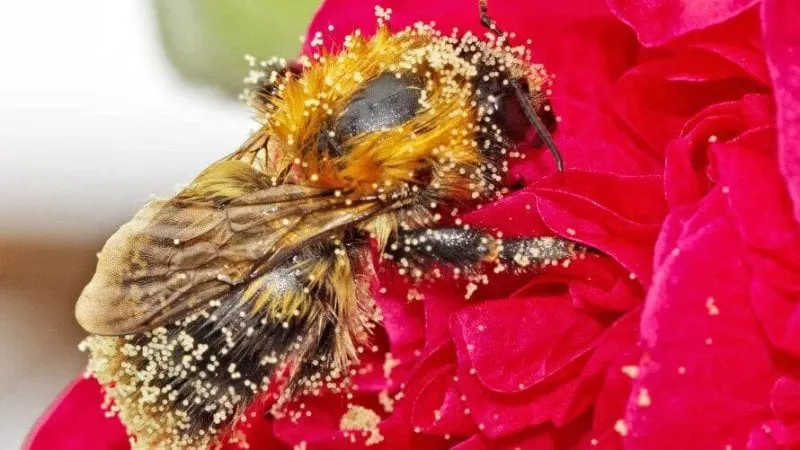Preventing spread of parasites, not cutting pesticide use, key to protecting bees
Preventing spread of parasites, not cutting pesticide use, key to protecting bees


For as long as beekeeping records have been kept, 1,100 years, there have been accounts of colony collapse disorder. Just about the only thing science has determined is not killing them off periodically are neonicotinoid pesticides, the one thing environmentalists insist is the problem.
While not in crisis, [bee populations] rebounded fine after the latest periodic blip in numbers, it’s good to think about how to prevent losses without incurring the cost of chemicals. One way, according to a new paper, is to prevent [parasite] spread between species.
…. [T]he new paper using 5,000 flowers sought to learn how parasites are spread across diverse bee and flower communities, including solitary bee species. They found that when bee communities are at their most diverse, the proportion of infected bees were at their lowest, and when flowers were at their most abundant, fewer were likely to be acting as transmission hubs.
The team screened more than 5,000 wildflowers and bees across a 24-week growing season, capturing changes as different flowers bloomed and different species of bee dominated. Over 110 bee species and 89 flower species were screened, revealing 42 percent of bee species (12.2 percent individual bees) and 70 percent of flower species (8.7 percent individual flowers) had at least one parasite in or on them.
Bees had the highest prevalence of parasites late in the season, when social bees formed the majority of screened bees and overall bee diversity was lowest. This suggests keeping bee diversity high, with a variety of social and solitary species present, could help reduce the spread of parasites.
Read the original post

 | Videos | More... |

Video: Nuclear energy will destroy us? Global warming is an existential threat? Chemicals are massacring bees? Donate to the Green Industrial Complex!
 | Bees & Pollinators | More... |

GLP podcast: Science journalism is a mess. Here’s how to fix it

Mosquito massacre: Can we safely tackle malaria with a CRISPR gene drive?

Are we facing an ‘Insect Apocalypse’ caused by ‘intensive, industrial’ farming and agricultural chemicals? The media say yes; Science says ‘no’
 | Infographics | More... |

Infographic: Global regulatory and health research agencies on whether glyphosate causes cancer
 | GMO FAQs | More... |

Why is there controversy over GMO foods but not GMO drugs?

How are GMOs labeled around the world?

How does genetic engineering differ from conventional breeding?
 | GLP Profiles | More... |

Alex Jones: Right-wing conspiracy theorist stokes fear of GMOs, pesticides to sell ‘health supplements’




 California, Washington, Oregon forge immunization alliance to safeguard vaccine access against federal undermining
California, Washington, Oregon forge immunization alliance to safeguard vaccine access against federal undermining Trust issues: What happens when therapists use ChatGPT?
Trust issues: What happens when therapists use ChatGPT? Fighting deforestation with CO2: Biotechnology breakthrough creates sustainable palm oil alternative for cosmetics
Fighting deforestation with CO2: Biotechnology breakthrough creates sustainable palm oil alternative for cosmetics Viewpoint — Fact checking MAHA mythmakers: How wellness influencers and RFK, Jr. undermine American science and health
Viewpoint — Fact checking MAHA mythmakers: How wellness influencers and RFK, Jr. undermine American science and health 30-year-old tomato line shows genetic resistance to devastating virus
30-year-old tomato line shows genetic resistance to devastating virus The free-range chicken dilemma: Better for birds, but with substantial costs
The free-range chicken dilemma: Better for birds, but with substantial costs Viewpoint: Video — Big Solar is gobbling up productive agricultural land and hurting farmers yet providing little energy or sustainabilty gains
Viewpoint: Video — Big Solar is gobbling up productive agricultural land and hurting farmers yet providing little energy or sustainabilty gains ‘You have to treat the brain first’:Rethinking chronic pain with Sanjay Gupta
‘You have to treat the brain first’:Rethinking chronic pain with Sanjay Gupta
